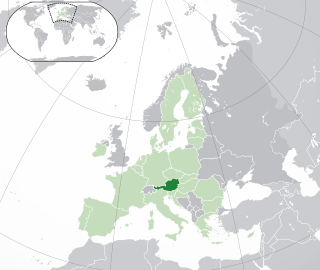The association of Nazism with occultism occurs in a wide range of theories, speculation and research into the origins of Nazism and into Nazism's possible relationship with various occult traditions. Such ideas have flourished as a part of popular culture since at least the early 1940s, and gained renewed popularity starting in the 1960s. Books on the topic include The Morning of the Magicians (1960) and The Spear of Destiny (1972). Nazism and occultism have also been featured in numerous documentaries, films, novels, comic books, and other fictional media. Notable examples include the film Raiders of the Lost Ark (1981), the Wolfenstein video game series, and the comic-book series Hellboy (1993-present).
Der Standard is an Austrian daily newspaper published in Vienna.
Austrian literature is the literature written in Austria, which is mostly, but not exclusively, written in German. Some scholars speak about Austrian literature in a strict sense from the year 1806 on when Francis II disbanded the Holy Roman Empire and established the Austrian Empire. A more liberal definition incorporates all the literary works written on the territory of today and historical Austria, especially when it comes to authors who wrote in German. Thus, the seven-volume history of Austrian literature edited by Herbert Zeman and Fritz Peter Knapp is titled Geschichte der Literatur in Österreich. Austrian literature must be considered in close connection with German literature in general, and the borderline between proper German literature and that of Austria is porous, due to rich and complex cultural exchanges.

The history of the Jews in Austria probably begins with the exodus of Jews from Judea under Roman occupation. Over the course of many centuries, the political status of the community rose and fell many times: during certain periods, the Jewish community prospered and enjoyed political equality, and during other periods it suffered pogroms, deportations to concentration camps and mass murder, and antisemitism. The Holocaust drastically reduced the Jewish community in Austria and only 8,140 Jews remained in Austria according to the 2001 census, though other estimates place the current figure at 9,000, 15,000, or 20,000 people, if accounting for those of mixed descent.

Hermann N. Mückler is an Austrian anthropologist and political scientist, specialized on the Asia-Pacific region, with a focus on Oceania, especially Fiji, Melanesia, and Polynesia.

The Fatherland Front was the right-wing conservative, nationalist and corporatist ruling political organisation of the Federal State of Austria. It claimed to be a nonpartisan movement, and aimed to unite all the people of Austria, overcoming political and social divisions. Established on 20 May 1933 by Christian Social Chancellor Engelbert Dollfuss as the only legally permitted party in the country, it was organised along the lines of Italian Fascism, except that the Fatherland Front was fully aligned with the Catholic Church and did not advocate any racial ideology, as later Italian Fascism did. It advocated Austrian nationalism and independence from Germany on the basis of protecting Austria's Catholic religious identity from what they considered a Protestant-dominated German state.

Omniscriptum Publishing Group, formerly known as VDM Verlag Dr. Müller, is a German publishing group headquartered in Riga, Latvia. Founded in 2002 in Düsseldorf, its book production is based on print-to-order technology.
Verlag is the German language word for "publisher". It occurs in the name of several German, Austrian and Swiss publishing firms, including:
Erich Kern, was an Austrian journalist. He became a writer of revisionist books that sought to glorify the activities of the German soldiers during the Second World War.
Birkhäuser is a former Swiss publisher founded in 1879 by Emil Birkhäuser. It was acquired by Springer Science+Business Media in 1985. Today it is an imprint used by two companies in unrelated fields:

The July Putsch was a failed coup attempt against the Austrofascist regime by Austrian Nazis from 25 to 30 July 1934.
Thomas Sautner is an Austrian painter and writer.

German nationalism is a political ideology and historical current in Austrian politics. It arose in the 19th century as a nationalist movement amongst the German-speaking population of the Austro-Hungarian Empire. It favours close ties with Germany, which it views as the nation-state for all ethnic Germans, and the possibility of the incorporation of Austria into a Greater Germany.
Ruth von Mayenburg was an Austrian journalist, writer and translator. In her earlier years, she was politically active in the Communist Party of Austria. Fleeing the Nazis, she lived in exile in the Soviet Union at Moscow's Hotel Lux, afterwards writing several books about her experiences there.

The Social Democratic Party of Austria, founded and known as the Social Democratic Workers' Party of Austria until 1945 and later the Socialist Party of Austria until 1991, is a social-democratic and pro-European political party in Austria. Founded in 1889, it is the oldest extant political party in Austria. Along with the Austrian People's Party (ÖVP), it is one of the country's two traditional major parties.

Friedrich Wolfgang "Fritz" Adler was an Austrian socialist politician and revolutionary. He is perhaps best known for his assassination of Minister-President Karl von Stürgkh in 1916.
Bernd Wegner is a German historian who specialises in military history and the history of Nazism. Since 1997 he has been professor of modern history at the Helmut Schmidt University in Hamburg, Germany.
Dariusz Adamczyk is a Polish-German historian.
Claudia von Werlhof is a German sociologist and political scientist. She held the first professorship for women's studies in Austria, based at the Institute for Political Science at the University of Innsbruck.
Ilse Erika Korotin is an Austrian philosopher and sociologist. She researched and published on the history of ideas of Nazism. At the Institute for Science and Art in Vienna, she heads the Documentation Centre for Women's Studies. Her work focuses on feminist biographical research and history of science.







